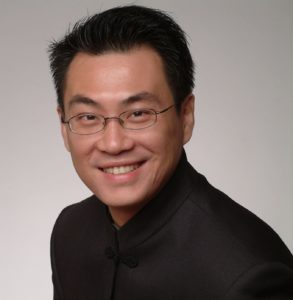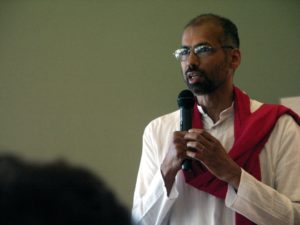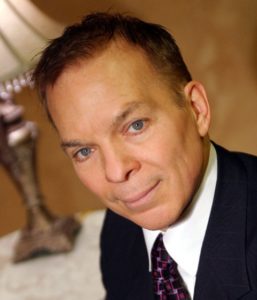La Toma de Riesgos al Programar
Formas de Explorar Música Nueva
Cara Tasher
Directora de actividades corales
¿Cuántos directores programan música fuera de su zona cómoda para poder explorar nuevas expresiones culturales o encargar obras a compositores? Si un director quiere explorar música nueva pero nunca lo ha hecho espero que este artículo le sirva como una pequeña inspiración. He preguntado a algunos directores experimentados provenientes de diferentes antecedentes para que nos ayuden con sus reflexiones.
¿Qué es la zona cómoda? En esencia, algunos de nosotros tenemos una línea clara entre nuestra zona cómoda y nuestra zona incómoda. André De Quadros (Boston University) y yo discutimos esto durante un largo rato, explorando la idea de que la “zona cómoda” constituye las cosas sobre las cuales nosotros pensamos que sabemos, por ejemplo, una cantata de Bach. Si alguien le pide que interprete una misa Filipina, puede parecer fuera de su reino. Sin embargo, uno puede utilizar el mismo microscopio que usa para cualquier pieza que parezca exótica que el que uno usaría para Bach.
Algunos excelentes y considerados directores se hacen las mismas preguntas para cada obra que dirigen, de manera que nada sea desconocido al presentar la partitura a su grupo. Cuando Robert Shaw se acercaba a una obra (antigua o nueva) empezaba desde cero como si nada le fuera familiar. Cuando uno quiere entender las bases de cualquier obra para ser presentada, debería ser consistente: ¿Qué conozco acerca de este periodo? ¿Qué tipo de color vocal es característico de este compositor o género y que puedo obtener de mi coro? ¿Cuál es el contexto en la vida del compositor, su lenguaje armónico y la complejidad rítmica? ¿Cómo me acerco a los textos y transliteraciones? Estas preguntas son las mismas sin importar el tipo de repertorio que usted va a ejecutar. Pareciera que mucha gente asume cosas debido a su familiaridad con ciertos temas y en esencia descuida ciertos repertorios por las razones equivocadas. La gente piensa que conoce a Bach porque lo ha estudiado, ha realizado algunas de sus obras, puede pronunciar el alemán usando el IPA, etc. Por lo tanto escogen no visitar el terreno de lo desconocido porque piensan que conocen sobre Bach, y piensan que NO saben nada acerca de la música Indonesia. André lo explicó brevemente “¿Qué saben la mayoría de directores acerca de la Edad de la Ilustración? Sin embargo ejecutan esta música como si estuviera dentro de su zona cómoda. Y simultáneamente piensan que necesitan saber todo acerca de la cultura Indonesia antes de trabajar este repertorio”. La claridad y simplicidad de esta frase fue abrumadora – la razón por la cual cierto repertorio ha sido olvidado no está en el “no lo se”, sino debido a que estamos utilizando un razonamiento extremadamente simplista con lo que tiene que ver con un tema.
Cara Tasher (CT): ¿Por qué uno debería trabajar música que se encuentre fuera de su zona cómoda?
André de Quadros (ADQ): ¿Por qué uno debería estudiar la Historia Mundial? ¿Por qué debería uno molestarse en aprender otro idioma? Nuestro mundo esta cada vez más globalizado. Cuando la moneda china se mueve, afecta la economía americana, etc.
André de Quadros terminó recientemente de editar una pieza Arabe Fog Elna Khel de un compositor Sirio – Iraquí. “La parte más interesante es su maravillosa melodía Iraquí tradicional; es una canción de amor – compara la luna con el rostro de la amada…” Esta obra, y una cuidadosa traducción y transliteración artesanal fue publicada en una nueva serie de earthsongs llamada Música Coral Salamu Aleikum del Mundo Musulmán.
Yu-Chung Johnny Ku (JK) (Taipei Philharmonic Chorus): Para mi, uno de los valores fundamentales de las artes es el factor creativo. Puede ser un nuevo punto de vista con relación al compositor, un nuevo acercamiento frente a una pieza antigua, una nueva filosofía de programación una nueva manera de interpretar, o simplemente una nueva composición. La creatividad es una de las fuerzas más importantes para impulsar las artes – para evolucionar, para seguir adelante. Miren a Dufay, Moteverdi, J.S. Bach, Beethoven, Liszt, Wagner, Stravinsky y muchos otros. Sin su creatividad nosotros no tendríamos la música que experimentamos en el presente. Por lo tanto, con el fin de desarrollar nuestra música, tenemos que ejecutar música que no ha sido presentada antes. Es un reto tanto para los artistas como para el público, requiere de coraje y una mente abierta sin importar el miedo de una reacción negativa por parte del público ya que es más difícil para ellos el hecho de aceptar esta nueva música o incluso a asistir a uno de estos conciertos.

(CT): ¿Cómo describiría usted su acercamiento a la música que nunca antes ha sido ejecutada o a la música que se ejecuta menos particularmente en su cultura?
Dr. Earl Rivers (ER) (Conservatorio de Música de la Universidad de Cincinnati): Cuando me acerco a una obra que ha sido encargada para estrenar o una obra que nunca he trabajado, busco primero más información acerca del compositor y sus trabajos. Busco no solamente sus obras corales, sino también, y más importante, obras para otros formatos – orquesta, opera, cuarteto de cuerdas y música de cámara. Tener una percepción más amplia acerca de la producción del compositor me prepara para analizar una nueva obra, a anticipar procedimientos composicionales, incluyendo forma, tratamiento armónico y melódico, ubicación del texto y facilidad con la escritura instrumental. Hago un macro análisis de la estructura formal para determinar cómo está unificada la pieza y qué tipo de contrastes hay. Seguidamente, empiezo un análisis detallado para delinear las estructuras de las frases y el tratamiento armónico. Un análisis detallado es un procedimiento largo y que continúa por mucho tiempo mientras adiciono capas de detalles con estudios adicionales y continúo refinando mi entendimiento de la obra y mi habilidad para interiorizarla.
(CT): Siendo un director que ha encargado varias obras, por favor explíquenos cómo escoge a qué compositor seleccionará.
(ER): En una obra encargada, busco ideas originales para expresar texto y música. Para citar una experiencia reciente de encargo, conocí la obra a cappella de Aaron Jaz Kernis Ecstatic Meditations, durante el Simposio Mundial de la FIMC en Rotterdam y esta obra de tres movimientos me dejó embelesado. En “No Puedo Bailar, oh Señor” Kernis, gracias a métricas mixtas y un contrapunto rítmico, captura y guarda una enorme energía de una manera que yo no había visto antes expresada en la música coral. Igualmente, en “Cómo el alma le habla a Dios”, la soprano y el tenor dialogan con el coro en dos planos armónicos distintos, creando un caleidoscopio de interesantes progresiones armónicas. Presenté Ecstatic Meditations con el Coro de Cámara del Conservatorio y el Ensamble Vocal de Cincinnati (También incluí en el programa “Enséñame tus maneras, Oh Señor” también de Kernis’, un himno accesible que presenta un dispositivo composicional que repite cuatro minutos de un pedal de órgano ostinato). Cuando tuve la oportunidad de encargar una obra con motivo de la restauración de un órgano de mediados del siglo XIX del histórico templo de Plum Street en Cincinnati, Kernis fue mi primera opción. Había tenido la oportunidad de escuchar y trabajar su música durante varios años, por lo tanto creía que era un compositor excepcional con ideas composicionales originales. Sus Dos Meditaciones encargadas por el Centro de Música Sacra Tangeman del Conservatorio que fueron estrenadas por el Ensamble de Arts Vocales en 2006 fueron exitosas en muchas maneras, especialmente en el manejo de las frases largas, la puntuación de pasajes de órgano y los contrastes de texturas. Cuando tenga la siguiente oportunidad de encargar una obra, al seleccionar al compositor me aprovecharé de los recursos de mis experiencias con sus obras incluyendo escuchar, estudiar, realizar y reflexionar.
(CT): Describa algunas de sus experiencias con respecto al encargar obras o realizar música nueva.
(ER): Actualmente estoy aprendiendo dos nuevas obras para Febrero de 2010. Incluí en la programación “Suenen Campanas salvajes hacia el cielo salvaje” de Augusta Read Thomas y el “Credo” de Penderecki. Comencé un estudio concienzudo de estas obras a principios de la primavera de 2009. Habiendo realizado y estudiado previamente obras de ambos compositores, tenía una mejor preparación para empezar un análisis de cada pieza. Estudio de la partitura, preparación de la partitura y escuchar me permitió tener una mejor comprensión de las obras y me dio ideas para la interpretación que no habría tenido simplemente con escuchar las grabaciones. Un análisis exhaustivo también me ha dado confianza en cuanto a los planes de ensayo que he diseñado para los coros (mixto e infantil), solistas (solos, quinteto y octeto) y la orquesta, así como también en cuanto a mi habilidad para producir una presentación estupenda de estas obras.
(JK): Presentar música nueva no es solamente una misión obligada para mí, sino que también es divertido. Durante el proceso de aprender/ensayar/presentar una pieza nueva, uno puede estar produciendo un sonido nuevo, recreando una visión nueva, descubriendo un mundo nuevo, creando una experiencia disfrutable tanto para el público como para los artistas. Creo que con la obra correcta [en el contexto correcto] – una composición nueva o música perteneciente a otra cultura puede entregar una visión nueva, una nueva experiencia de escucha y de vista, o incluso sorprender al público – tiene el potencial de ser aceptada y apreciada incluso en Asia que es tan conservadora. Para la gente parece más fácil aceptar música que se presenta menos en una cultura particular. En varias ocasiones he enseñado música china y taiwanesa a coros Americanos, y presentado música china y taiwanesa en los EE.UU y en Europa. De otro lado, presento mucha música occidental en Asia. De cualquier modo, usualmente los auditorios pueden aceptar fácilmente música proveniente de otras culturas. Puede que estén sorprendidos, impresionados y encantados por el sabor exótico. Dicho esto, pienso que a la gente le tomará mucho tiempo para verdaderamente entender y presentar música de diferentes culturas, pero creo que vamos por buen camino. De acuerdo.
Gracias a André de Quadros, Johnny Chu, and Earl Rivers por su contribución en esta edición del rincón del Compositor. Mientras le damos la bienvenida a nuestro nuevo editor, seguimos abiertos a cualquier comentario relacionado con lo que les gustaría que esta sección incluyera. Por favor escríbame a ctasher@gmail.com
 Debido a su significativa experiencia en organizaciones como el Coro Infantil de Glen Ellyn, el Coro Sinfónico de Chicago, el Coro Sinfónico de Atlanta, el Coro Trinity de Wall Street, Conspirare, y Experimento en la vida Internacional, la Dr. Cara Tasher, Directora de Actividades Corales de la Universidad de Florida del Norte (Jacksonville), se esfuerza por inculcarles a sus estudiantes la pasión por la excelencia apreciando las diferentes culturas. Recientemente fue maestra de coro de la Ópera de Bellas Artes en Ciudad de México. Tasher ha preparado obras maestras para organizaciones profesionales y ha trabajado con numerosas escuelas secundarias y ensambles comunitarios. Mientras era directora asociada del Coro de Gente Joven de la Ciudad de Nueva York, diseño dos ensambles y dos talleres anuales para continuar floreciendo. Durante los últimos 5 años Tasher ha continuado ese ímpetu como directora/coordinadora del Festival Vocalizza en Portugal y ha sido activa en EE.UU como directora invitada, tallerista y jurado. Cara estudió en el Conservatorio de Música de la Universidad de Cincinnati, la Universidad de Texas en Austin, La Sorbona de Paris, Northwestern University y actualmente hace parte de la Junta Directiva de ACDA Florida.
Debido a su significativa experiencia en organizaciones como el Coro Infantil de Glen Ellyn, el Coro Sinfónico de Chicago, el Coro Sinfónico de Atlanta, el Coro Trinity de Wall Street, Conspirare, y Experimento en la vida Internacional, la Dr. Cara Tasher, Directora de Actividades Corales de la Universidad de Florida del Norte (Jacksonville), se esfuerza por inculcarles a sus estudiantes la pasión por la excelencia apreciando las diferentes culturas. Recientemente fue maestra de coro de la Ópera de Bellas Artes en Ciudad de México. Tasher ha preparado obras maestras para organizaciones profesionales y ha trabajado con numerosas escuelas secundarias y ensambles comunitarios. Mientras era directora asociada del Coro de Gente Joven de la Ciudad de Nueva York, diseño dos ensambles y dos talleres anuales para continuar floreciendo. Durante los últimos 5 años Tasher ha continuado ese ímpetu como directora/coordinadora del Festival Vocalizza en Portugal y ha sido activa en EE.UU como directora invitada, tallerista y jurado. Cara estudió en el Conservatorio de Música de la Universidad de Cincinnati, la Universidad de Texas en Austin, La Sorbona de Paris, Northwestern University y actualmente hace parte de la Junta Directiva de ACDA Florida.
Traducción del inglés por María Catalina Prieto, Colombia

